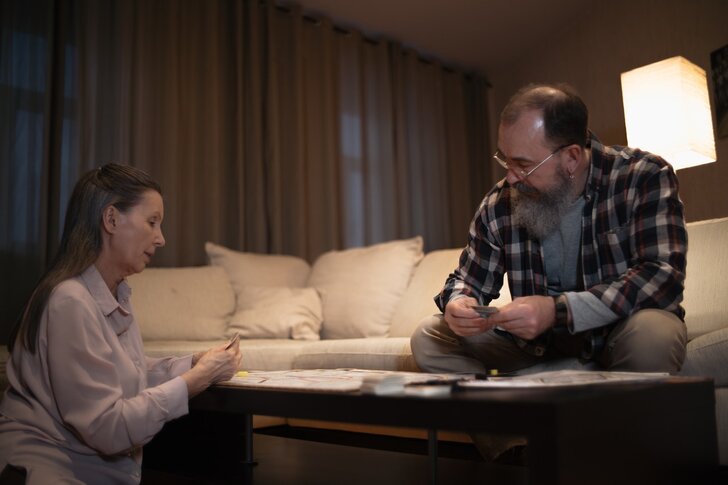
The Hows and Whys to a Sleep Divorce

Do little things like your partner chewing food, talking over the phone loudly, snoring at night, or leaving stuff on the bed irritate you? Well, you’re not alone!

Kampus Production/Pexels | Since the pandemic, couples have spent most of their time together. But no matter how much they love each other, the need for personal space is consistent
Ever since the pandemic, couples have been spending most of their time together. For almost a year, they’ve been performing every task as a team. But with the whole WFH scenario snowballing into somewhat of a permanent setting, some have started realizing that no matter how much they love their better halves, the need for personal space is consistent.
And that’s where a sleep divorce comes into the picture!
So what’s a sleep divorce?
A sleep divorce is basically an arrangement between a couple whereby individuals decide they need separate sleeping arrangements for a good night’s sleep. That being said, it doesn’t necessarily mean the couples will be sleeping in different rooms. Couples could sleep in different beds or at different times, depending on what they’re comfortable in.
There could be numerous reasons why couples opt for a sleep divorce, but the basic one is to spend some quality time alone. If you’ve been planning to confess this to your partner but aren’t sure about how to do so, here are a few tips that might help you out.

Mikhail Nilov/Pexels | There could be numerous reasons why couples opt for a sleep divorce, but the basic one is to spend some quality time alone
#1 – Remind yourself, sleeping alone doesn’t mean the end of your relationship
If you’ve decided that sleeping solo is what you need for a few months or maybe for the rest of your life, don’t relate it to your overall relationship. Self-doubt and questioning are the first things that damage any bond. No matter how good your equation with your partner is, if you let unnecessary things trouble you, it will impact your bond one day. So try to be positive and remember that the step you’re taking is for your mental health’s sake.
#2 – Try to be gentle while disclosing the issue to your partner
Usually, when an individual has trouble sleeping, his or her partner already knows about it. However, when you speak about your issues, try to be gentle in your approach. It shouldn’t look like that your partner’s mere existence is hampering your sleep; otherwise, things could take a wrong turn. You must know that there’s an emotional bond you share with the next person, and by no means should you want to hinder it. Hence be very careful with your words and try to stick to the problem at hand.
#3 – Spend some cozy time before going to bed
Dr. Emily Jamea, Ph.D., L.M.F.T., suggests couples continue with their routine despite observing sleep divorce. Say, for example, if you and your partner like to chat before going to bed or cuddle each other or maybe watch some TV together, you should continue to do so. Jamea believes having a nighttime ritual makes sleeping separately less foreign and keeps the bond as strong as it should be.

Tima Miroshnichenko/Pexels | Experts believe having a nighttime ritual makes sleeping separately less foreign and keeps the bond as strong as it should be
#4 – Be ready for some sleep compromise
Even though your partner understands your problem, he or she might not be willing to sleep away from you every day. He or she can ask you for some compromise like sleeping away on weeknights and together on weekends. Just like that, you can have your own relationship terms and live peacefully in each other’s company.
To sum it up
Hoping that you might have gone through all the points listed above, we think now you’ll have a clear idea of what a sleep divorce looks like and how it can be pulled off without hurting the other person. So, when are you going to pop the question?
More in Way of Life
-
Endometriosis in Teens: A Guide to Understanding and Supporting Adolescents
Endometriosis, a condition often associated with adulthood, can make an unwelcome entrance during adolescence. For teenagers grappling with the complexities of...
January 23, 2024 -
Has Childhood Trauma Haunted You into Adulthood? Here’s How You Can Defeat the Past
Even without being particularly too keen about it, you must have noticed that the conversation around childhood trauma has been gaining...
January 10, 2024 -
Storing These Food Items in Your Fridge May Actually Be Bad For You
People have a tendency to just stash a lot of things inside their refrigerators. Oftentimes, you don’t even remember what’s inside...
January 10, 2024 -
How to Deal With Holiday Stress
We all feel stressed from time to time, but the holidays offer their own special stressors that can make us feel...
December 21, 2023 -
Tips to Develop a More Focused Mind
Do you ever feel you’re always busy and the days are progressively getting shorter? Are you constantly stressed out and unable...
December 21, 2023 -
How To Develop A Healthy Relationship With Weight
Most of us have a complicated relationship with weight and spend most of our days on the scale, letting our minds...
December 21, 2023 -
Advantages of Offering Health and Wellness Benefits to Employees
Employers frequently struggle to provide the benefits that their employees desire, such as health insurance or paid overtime. Changes to federal...
December 21, 2023 -
Can Acupuncture Help Prevent Type 2 Diabetes?
In today’s world, health conditions like cardiovascular diseases, hypertension, and diabetes are becoming more and more common. It is extremely important...
December 4, 2023 -
Did You Know There’s A Tiny Farm In A Berlin Supermarket?
When you go to a grocery store, you head over to the fresh foods aisle where you pick up things like...
December 4, 2023















You must be logged in to post a comment Login